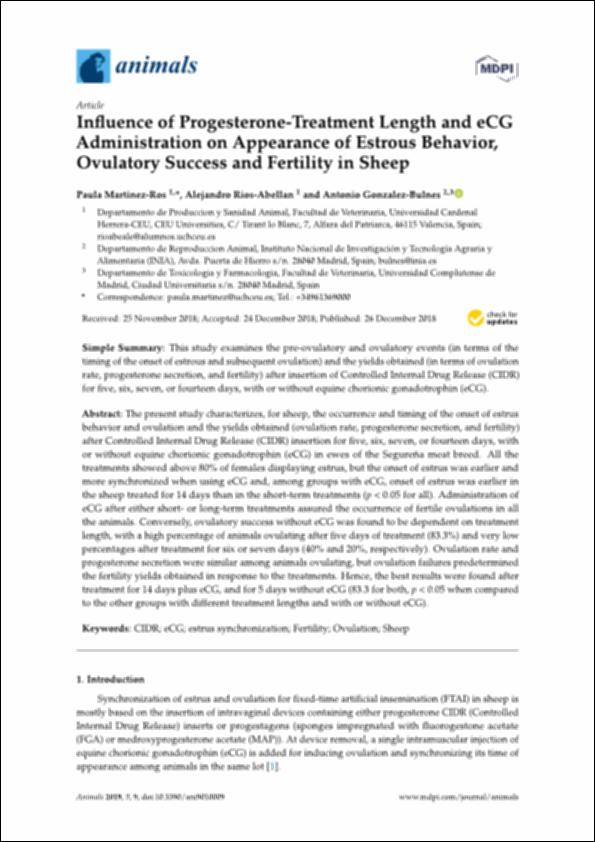Por favor, use este identificador para citar o enlazar este ítem:
http://hdl.handle.net/10637/10606Influence of progesterone-treatment length and eCG administration on appearance of estrous behavior, ovulatory success and fertility in sheep
| Título : | Influence of progesterone-treatment length and eCG administration on appearance of estrous behavior, ovulatory success and fertility in sheep |
| Autor : | Martínez Ros, Paula Ríos Abellán, Alejandro González de Bulnes López, Antonio |
| Materias: | Reproducción animal.; Ovejas - Reproducción.; Sheep - Reproduction.; Reproduction.; Progesterona.; Estrus.; Sincronización.; Synchronization.; Progesterone.; Estro. |
| Editorial : | MDPI |
| Citación : | Martinez-Ros, P., Rios-Abellan, A. and Gonzalez-Bulnes, A. (2019). Influence of progesterone-treatment length and eCG administration on appearance of estrous behavior, ovulatory success and fertility in sheep. Animals, vol. 9, n. 1, art. 9. DOI: https://doi.org/10.3390/ani9010009 |
| Resumen : | The present study characterizes, for sheep, the occurrence and timing of the onset of estrus behavior and ovulation and the yields obtained (ovulation rate, progesterone secretion, and fertility) after Controlled Internal Drug Release (CIDR) insertion for five, six, seven, or fourteen days, with or without equine chorionic gonadotrophin (eCG) in ewes of the Segureña meat breed. All the treatments showed above 80% of females displaying estrus, but the onset of estrus was earlier and more synchronized when using eCG and, among groups with eCG, onset of estrus was earlier in the sheep treated for 14 days than in the short-term treatments (p < 0.05 for all). Administration of eCG after either short- or long-term treatments assured the occurrence of fertile ovulations in all the animals. Conversely, ovulatory success without eCG was found to be dependent on treatment length, with a high percentage of animals ovulating after five days of treatment (83.3%) and very low percentages after treatment for six or seven days (40% and 20%, respectively). Ovulation rate and progesterone secretion were similar among animals ovulating, but ovulation failures predetermined the fertility yields obtained in response to the treatments. Hence, the best results were found after treatment for 14 days plus eCG, and for 5 days without eCG (83.3 for both, p < 0.05 when compared to the other groups with different treatment lengths and with or without eCG). |
| Descripción : | Este artículo se encuentra disponible en la siguiente URL: https://www.mdpi.com/2076-2615/9/1/9 Este artículo pertenece a la sección "Animal Reproduction". |
| URI : | http://hdl.handle.net/10637/10606 |
| Derechos: | http://creativecommons.org/licenses/by/4.0/deed.es |
| ISSN : | 2076-2615 (Electrónico) |
| Fecha de publicación : | 25-ene-2019 |
| Centro : | Universidad Cardenal Herrera-CEU |
| Aparece en las colecciones: | Dpto. Producción y Sanidad Animal, Salud Pública Veterinaria y Ciencia y Tecnología de los Alimentos |
Los ítems de DSpace están protegidos por copyright, con todos los derechos reservados, a menos que se indique lo contrario.


